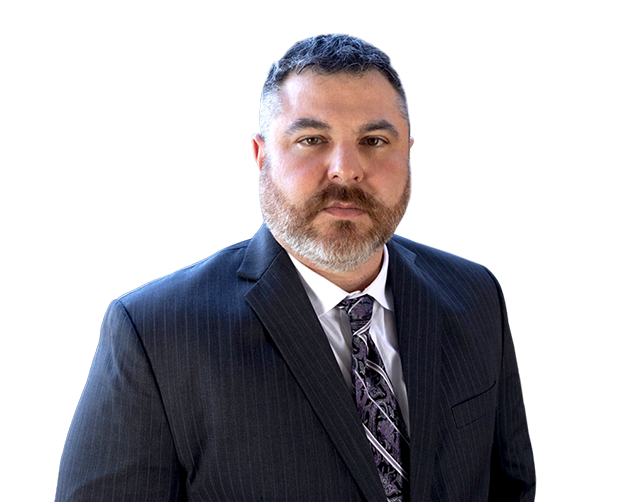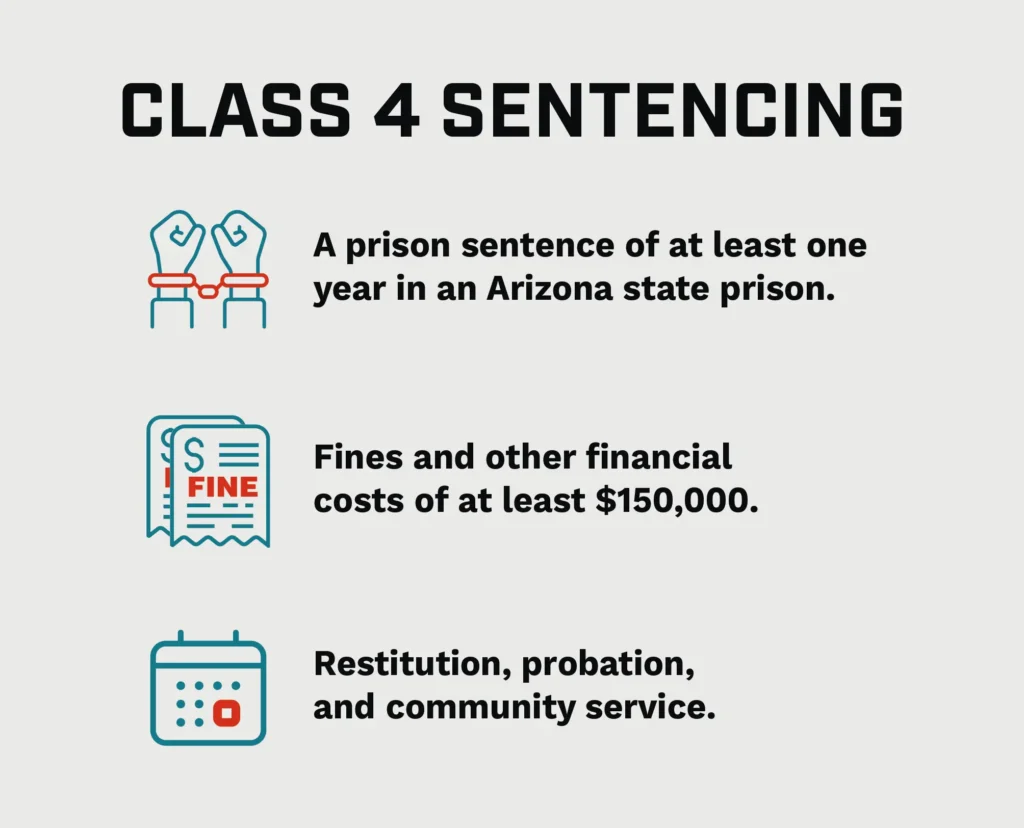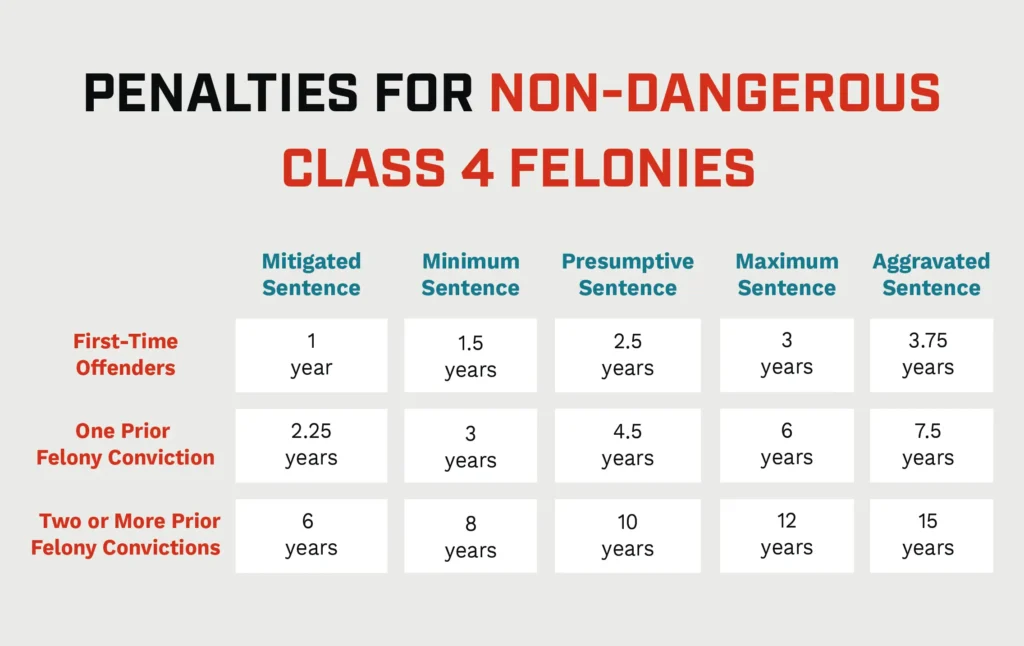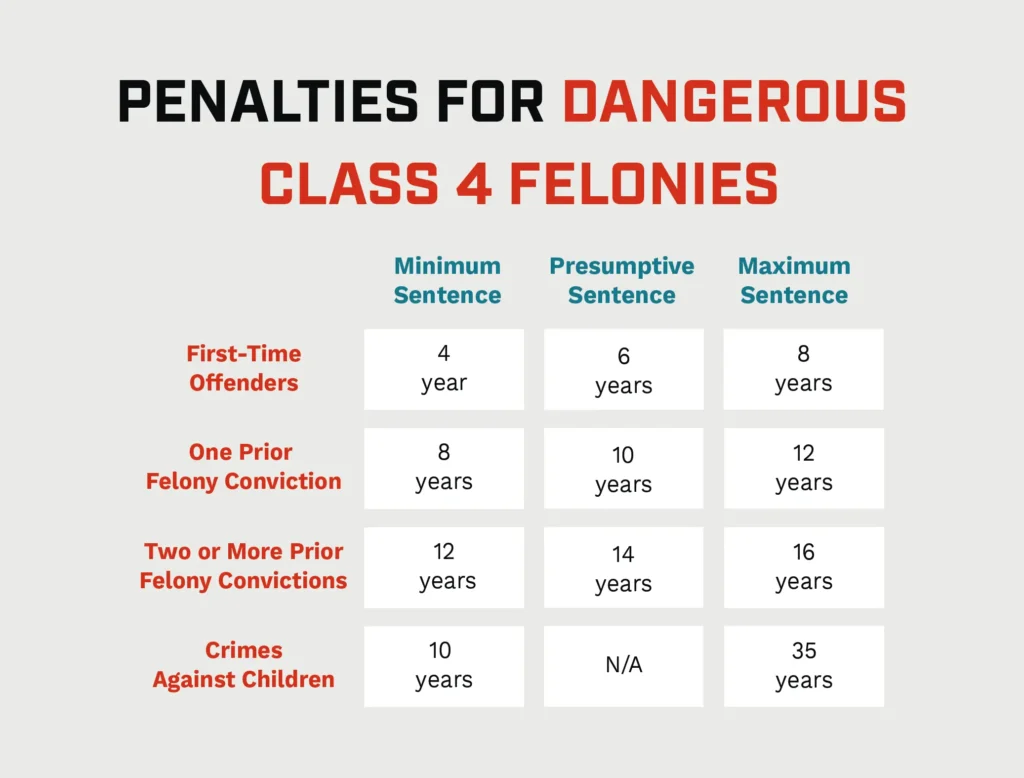
Posted on July 3, 2024 in General
The Arizona legal system provides prosecutors and courts with many options to punish people who commit a criminal offense that the state wants to discourage. Aside from petty offenses, misdemeanor laws deal with minor infractions and are punishable by jail time. Felony laws exist to sanction more serious criminal offenses and carry a prison sentence for a person found guilty.
At the AZ Defenders law firm, we represent clients charged with misdemeanor and felony crimes. If you have been charged with a felony in Arizona, call us at (480) 456-6400 to talk with a highly experienced criminal defense attorney. We are available 24 hours a day to take your call every day of the year.
On this page, we cover Class 4 felony crimes in Arizona. We will explain what a Class 4 felony is, the penalties for a Class 4 felony conviction, and what you can do to protect your legal rights if you are accused of a Class 4 felony offense.
Of the six classes of felony crimes in Arizona, a Class 4 felony is considered a mid-range felony. It is not as serious as a higher-level offense like murder (Class 1), arson of an occupied structure (Class 2), or telecommunication fraud (Class 3).
On the other hand, a Class 4 felony is treated more harshly under Arizona criminal law than crimes like credit card theft (Class 5) or custodial interference (Class 6).
Class 4 felonies in Arizona include more than 90 kinds of felony charges:
Other not-so-common kinds of Class 4 felonies include altering livestock brands, attempting to influence a juror, theft of protected native plants, or smuggling.
An experienced Arizona criminal defense lawyer like ours at AZ Defenders can help you to understand the kind of charge you are being accused of, how serious it is, and what the state must prove to obtain a conviction.
As mentioned, there are six classes of felonies in Arizona, with Class 1 being the most serious and Class 6 being the least.
Class 1 is reserved for first-degree murder and second-degree murder charges. Sanctions for Class 1 felonies can include life imprisonment or even the death penalty.
Class 2 felonies are the most serious you can be accused of, short of murder. Examples of Class 2 felonies are violent crimes like:
Class 2 felonies carry lengthy prison sentences, up to life in prison.
Class 3 felonies include more than 40 specific offenses, including first and second-degree burglary, aggravated identity theft, transportation and sale of dangerous or narcotic drugs, and sexual abuse of a minor.
Examples of Class 5 felonies include stalking, credit card theft, criminal damage, credit card fraud over $1,000, and aggravated domestic violence.
These are the least serious felonies in Arizona that you can be found guilty of. Trial court judges often use discretion to reduce them to misdemeanor-level charges, giving them the nickname “wobblers.”
Generally speaking, a conviction for a Class 4 felony will result in any or all of the following consequences:

The range of Class 4 felony sanctions is broad. The sentence a court imposes will depend on the unique facts of each case. These include whether you have any prior felony criminal convictions on your record, whether they were for non-dangerous or dangerous offenses, and whether any mitigating or aggravating factors exist.
Arizona’s guidelines for felony sentences establish five levels of seriousness. From least to most severe, this sentencing range is:
A presumptive prison sentence is considered to be the “baseline” for sentencing for a first time offender and can range from a minimum to a maximum sentence.
From this presumptive sentence starting point, the court will consider additional factors that can increase or decrease the duration of the sentence based on factors in mitigation or aggravation.
Mitigating circumstances can include your age, whether you were acting under duress, crimes in which you played only a minor role, and general considerations of your otherwise good character.
To factor into the sentencing consideration, at least two mitigating factors must be present in the criminal acts charged.
Aggravating circumstances can include possession or use of a dangerous weapon or a deadly weapon during the commission of the crime, committing a crime with an accomplice, premeditation (for example, “lying in wait” for the victim), and crimes in which the victim dies because of the defendant’s conduct.
To factor into an aggravated prison sentence, at least two aggravating factors must be present in the criminal acts charged.
Two additional subdivisions exist with Class 4 felonies: one for non-dangerous crimes, and the other for dangerous ones. The main difference is that a dangerous offense is a one involving the use or discharge of a firearm, or threatening someone with a deadly weapon or other dangerous instruments, or knowingly causing serious physical injury.
Any other crime is considered to be a non-dangerous offense.
A dangerous crime is not eligible for probation, even for a first offense.
Examples of Class 4 dangerous felonies include aggravated assault or armed robbery with a deadly weapon or a dangerous instrument, sexual exploitation of a minor, and aggravated domestic violence.
Class 4 felony charges involving a child victim have their own sentencing range that goes beyond aggravated sentences. If the dangerous offense against a child is also a Class 4 felony, like aggravated assault, then the sentencing range can increase from four to eight years in prison to 10 to 24 years instead.
The sentencing ranges for first-time non-dangerous offenders is as follows:
If you have prior felony convictions, the sentencing range can be increased based on the number of prior felonies.

For a first-time dangerous Class 4 felony, only the presumptive range for sentences exists (no mitigated or aggravated sentences).
Here is the range of sentences for a Dangerous Class 4 felony with no prior felony convictions:
Prior felony convictions can increase the sentencing for a dangerous Class 4 felony based on how many prior felonies you have.
A conviction under Arizona law for a dangerous Class 4 felony in which the victim is a child carries a separate penalty range. The Arizona criminal statute that covers dangerous crimes against children is ARS 13-705.
Depending on whether the conviction is for a first-time or a repeat offense, the minimum sentence can be 10 years, and the maximum sentence can be up to 35 years.

According to ARS 13-170, the statute of limitations for Class 4 felony charges is seven years.
Note that this seven-year statute only runs when the defendant is physically in the state. If he or she leaves the state, the statutory countdown period clock pauses.
Under Arizona laws, even a minimum sentence for a Class 4 first felony offense can cost you years in prison time, hefty fines, and a criminal record that follows you for the rest of your life if you are convicted. When the stakes are this high, can you afford not to have a defense attorney who is highly experienced in defending cases involving severe felonies?
At AZ Defenders, our experienced felony attorneys can guide you through the court process and make sure you receive a fair trial by building the strongest possible defense against any criminal charges you are facing. Our legal team is highly experienced in defending felony criminal cases and other serious offenses on behalf of our clients in Phoenix and throughout the entire state of Arizona.If you need legal help with an Arizona Class 4 felony case, then contact AZ Defenders today for a free initial consultation with an experienced criminal defense attorney by calling (480) 456-6400.